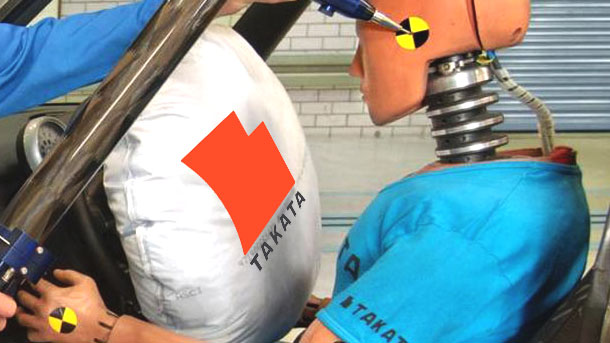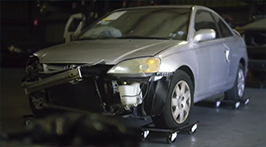Honda Races to Get Millions of Unsafe Takata Airbags Off The Road

Vehicle Recall Update: Millions of Defective Airbags Need Replacing
After the eleventh death connected to Takata’s defective airbag inflators in the U.S., Honda is racing to replace every recalled inflator in their vehicles before anyone else is killed. The Japanese automaker has partnered with CCC, a software provider that works with independent auto repair shops, to help notify owners of recalled Honda and Acura automobiles. The program, “True Recall,” is now operational in 22,000 independent shops nationwide.
The partnership comes after the National Highway Traffic Safety Administration (NHTSA) announced that automakers are “ultimately responsible” for Takata’s recalled airbag inflators. The administration also expressed worries over the number of recalled vehicles still on the road, especially the hundreds of thousands of older cars manufactured prior to 2003. Mark Rosekind, administrator of the NHTSA, said that of those older cars still on the road, the majority are Hondas. He went on to say that those older Honda’s with Takata airbags have a 50% chance of dangerously detonating in an accident.
VIN numbers, provided by Honda, will be used by local auto bodies to determine if a vehicle has one of the 10.7 million Takata inflators that were recalled in Hondas and Acuras (in total 70 million Takata airbag inflators have been recalled in the United States). The latest fatality occurred when a 2001 Honda Civic crashed in Riverside County, California, in September and the Takata inflator exploded, killing the driver who, according to Honda, had been sent ten recall notices over the last eight years.
Honda Motor Co., Ltd. will pay CCC for every recalled Honda or Acura that its software helps to identify. A Honda spokesperson said that soon after the implementation of “True Recall,” more than 1,000 vehicles were discovered daily. When CCC’s software discovers a recalled Honda or Acura vehicle, the repair shop takes three steps. First, they inform the owner, then inquire which authorized dealer the owner wants to use, and finally works with the dealer to replace the hazardous Takata airbag inflators.
Honda Sends Reps to Homes
“Safety is everyone’s responsibility,” said Leigh Guarnieri, a Honda marketing manager. Guarnieri explained that the partnership with CCC “will augment and extend our existing recall notification process, providing us with an additional touch point to help reach consumers with recalled yet unrepaired vehicles.” In addition, Honda has sent representatives to the homes of owners of older models to notify them of the recall and explain the potentially fatal dangers of not bringing in their vehicles to have the airbag inflators replaced.
The Takata recall affects 15 automakers and has been linked to over 150 injuries and 16 deaths worldwide, leading to several lawsuits. One suit was filed after Huma Hanig lost her life in Houston on March 31, when the 17-year old’s 2002 Honda Civic crashed and the Takata inflator exploded, shooting out metal shrapnel. Hanig’s family sued Takata, Honda, and the local dealership, about a month after her death. Last week, an undisclosed settlement with the Hanig family was announced in the wake of another lawsuit filed by Serena Martinez, who was injured in her 2002 Honda Civic, when the inflator exploded in a low-speed crash. Martinez credits her survival to the shrapnel, which hit her in the chest, missing any vital organs or major arteries.
“I thought I was going to bleed to death,” said Martinez. “I don’t understand how something that was supposed to protect me actually ended up causing my injuries.”
Check Your Takata Airbag Recall Status
To find out if you vehicle is affected see: https://vinrcl.safercar.gov/vin/
Approximately 33,000 tire-related crashes occur each and every year, resulting in about...
The Ford C-Max Energi Electric car is being blamed for starting more...
“The findings in this analysis conducted for The Safety Institute are disturbing,...
